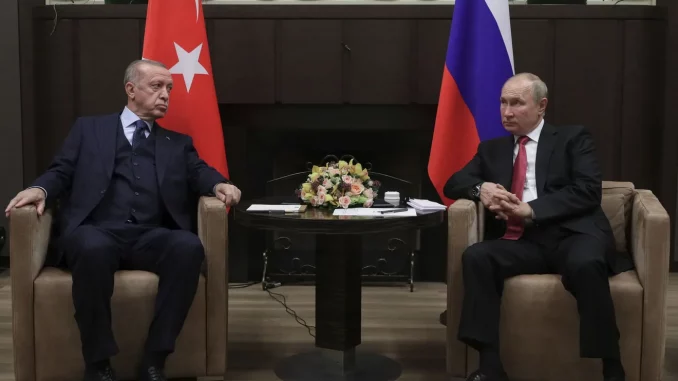Ankara faces increasing pressure to choose between Moscow and Kyiv.
BY DIMITAR BECHEV, POLITICO March 2, 2022 4:00 am
Russian President Vladimir Putin and his Turkish counterpart Recep Tayyip Erdo?an | Vladimir Smirnov/AFP Pool via Getty Images
Though it has only been less than one week, the war in Ukraine has already changed the face of Europe — for the worse.
Outside of the immediate conflict, one of the countries most affected is Turkey, which has profited from strong ties to both Moscow and Kyiv for a long time. Ankara’s delicate balancing act between its two partners is becoming much more difficult to sustain as the fighting intensifies and the West ratchets up pressure on Russian President Vladimir Putin. As a part of NATO and a regional heavyweight, Turkey is under great pressure to finally pick a side.
Currently, Turkey gets about a third of its natural gas supplies from Russia. And though Putin and Turkish President Recep Tayyip Erdo?an often compete, they have also partnered in operations in Syria, Libya and the southern Caucasus. In 2019, Ankara procured S-400 missiles from Russia as well, a decision that has since poisoned its relations with the United States.<
>
<
>
Turkey also trades heavily with Ukraine and has had ambitious plans to foster defense-industrial cooperation between the two countries, with Turkish-made drones procured by Ukraine currently carrying out strikes on invading Russian troops. Turkey also views itself as kin state of the Crimean Tatars and has been openly denouncing the peninsula’s annexation since 2014.
After trying to have it both ways in the days leading out up to the invasion of Ukraine, Turkey has since already taken some steps to challenge Russia. First, it has closed the Bosphorus and the Dardanelles Straits to naval ships, taking advantage of its rights under the 1936 Montreux Convention in cases of war. Following a request made to Erdo?an by Ukrainian President Volodymyr Zelenskyy, this move was also welcomed by the U.S., though it carries mostly symbolic consequences. Russia’s Black Sea Fleet is already deployed and, even if it weren’t, Montreux allows ships to return to their homeport. Still, the closure of the straits prevents the Russians sending extra ships from the eastern Mediterranean.
Turkey has also turned up its diplomacy to match its more aggressive stance. First, Foreign Minister Mevlüt Çavu?o?lu described the conflict as a war — contradicting the Russian narrative of a spetsoperatsiya, a “special operation.” This was followed by a fiery speech from Turkey’s permanent representative to the U.N. Feridun Sinirlio?lu, in which he stated that the international community had the duty of defending helpless civilians. Erdo?an has called the Russian invasion “unacceptable,” and the state-run broadcaster TRT is taking a critical line on Russia too, praising Zelenskyy’s courageous leadership.
Yet Turkey is still not giving up on Russia. Ankara has not joined the Western economic sanctions, nor has it closed Turkish airspace to Russian traffic. It has not sent new shipments of arms and materials to Ukraine either.
The rhetoric coming from Ankara is that Turkey is a loyal member of NATO but also has to take care of its national interests. What this means in practice is that Erdo?an is still angling to be a mediator between Moscow and Kyiv, an offer he first made during a visit to Ukraine in early February. Now that the first round of talks between the two sides, held at the Ukrainian-Belarusian border, have yielded no cease-fire, he is discussing the matter with Belarusian President Alexander Lukashenko, too. More importantly, Zelenskyy already mentioned Istanbul as a potential site for negotiations.
Erdo?an has good reason to work toward de-escalation — and it is mostly economic. The war is already taking a toll on Russia’s economy as sanctions crater the ruble, and this is bound to affect Turkey, which is dependent on Russia for revenues from tourism as well as an export market for construction services and agricultural goods. A spike in energy prices would have an even more devastating impact on ordinary Turks whose incomes and savings have already been eaten away by runaway inflation this year.
Lest we forget, Erdo?an is fighting for reelection in 2023. The last thing he needs is a war coupled with an economic meltdown. And the prospect of NATO being dragged in or Russia unleashing a refugee wave from Syria is even scarier for the Turkish leader.
The trouble is that Putin is showing no signs of a climbdown. The Russian leader has implicitly threatened to use nuclear arsenal against the West, and Russian forces have been doubling down in Ukraine, bombarding and rocketing densely packed civilian areas in Kharkiv, the second largest city. Despite the heroic efforts of Ukrainian defenders, Russians are advancing on Kyiv too.
Putin is after a military victory, not a settlement. Once he takes the Ukrainian capital, then he might be willing to talk to the West again. But he will be expecting a phone call from U.S. President Joe Biden, not from Erdo?an or French President Emmanuel Macron.
Erdo?an would like to see Turkey as a mover and shaker in European geopolitics. Poised between Russia and the Western alliance, the Turkish leader has long played the two against each other, squeezing out the best deal for himself. However, when it comes to the new war, he is now very much on the receiving end.
There is no harm in Turkey playing the peacemaker, of course. Given the chance, we should all hope that Erdo?an succeeds. However, in order for that to happen, Ukraine would first have to be able to stop the Russian onslaught with Western help. So long as Putin thinks he can win, he won’t heed Erdo?an’s calls for restraint.
Dimitar Bechevis is a lecturer at the Oxford School of Global and Area Studies, a visiting scholar at Carnegie Europe and the author of “Rival Power: Russia in Southeast Europe” and “Turkey under Erdo?an.”




Leave a Reply
You must be logged in to post a comment.